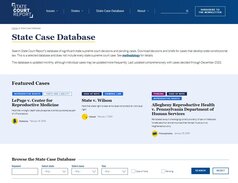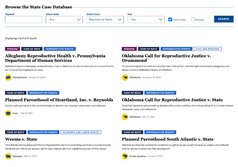
How to Use the State Case Database
Researchers, journalists, and the public can use this guide to help find court decisions and briefs related to state constitutional law.
State supreme courts issue hundreds of decisions every year affecting voting rights, reproductive care, protections related to the criminal justice system, and other state constitutional rights. With so much at stake, accessing information about these proceedings — dockets, briefs, opinions — should be simple.
But, often, it’s not so easy. Every state has its own system and practices for public access to case information. While about half of states provide briefs online, the process with others can be byzantine or functionally impossible. In many states you cannot even access a list of the documents filed in a case, known as the docket. In some states you must pay as much as $1 per page to obtain copies of documents you need.
To make it simpler to find key state constitutional decisions and supporting material, State Court Report created the State Case Database. We track, analyze, and compile hundreds of decisions issued since January 2021 from across the country, organizing them in a user-friendly interface searchable by issue, year, and state.
The database is curated — we do not include all state supreme court decisions, only those that develop state constitutional law in significant ways. That includes decisions in which the court’s majority opinion examines one or more state constitutional provisions in connection with a question it has not answered before, where it is departing from or extends precedent on a question it has answered before, or where the constitutional provision is new or has never been interpreted. The database also includes decisions in which a dissenting or concurring opinion has a substantial discussion of state constitutional law.
The database also includes a selection of pending cases that raise potentially significant questions of state constitutional law and that are awaiting action by lower, intermediate, and high courts. You can read more about our methodology here.
The database’s homepage looks like this:

How to use the database
We have created the database to serve anyone interested in learning more about the cases advancing state constitutional law across the country — judges, lawyers, scholars, students, journalists, and others. You can use this database to:
- Explore a specific case in detail. Easily find and download all relevant documents for a specific high court case.
- Track trends across states. Filter the database by issue to see what cases courts in different states are deciding on topics like environmental law, economic rights, or election law. Are similar disputes arising in different parts of the country, and are parties making similar arguments? Are judges approaching these claims in unique ways?
- Identify gaps and needs. Learn about claims percolating in other states that parties in your state might consider raising. Identify points of view that are not represented in state constitutional litigation, but should be. Determine what research might lead to more informed judicial decisions across the country.
- Dig deeper. Researchers and journalists can develop data analysis projects, using the documents in the database to build data sets related to trends in state constitutional litigation. Which entities are filing amicus briefs in high-profile cases? Are political parties or politicians weighing in? Are similar arguments and language being used across different states to develop constitutional arguments?
Searching the database
Case names and summaries are searchable by keyword, state, issue, and year. We provide the designation “cases of note” for cases that may be of heightened public interest or that are noteworthy for the novelty of their discussion of state constitutional law.
For example, search results for reproductive rights “cases of note” look like this:

Exploring individual cases and downloading documents
When you click on an individual case, you will see the collection of documents available. Click on the name of a document to download the PDF file. Some PDFs are searchable and some are not, depending on how the courts provide the information.
An individual case entry looks like this:

Issue categories
All cases will have at least one issue tag to help users find and understand the case. The tags reflect our analysis of the substance of the state constitutional questions raised in the case.
State Court Report tags cases by issue according to the taxonomy below:
At a time when attention to state courts is growing, we hope this will be a resource for anyone interested in better understanding state constitutional developments. If there are ways you think the database could be made more useful for your purposes, please let us know. And if you know of a pending or decided case that should be included in the database or believe you have identified an error in the database, please submit tips to database [at] statecourtreport [dot] org (database[at]statecourtreport[dot]org).
Nancy Watzman is a consultant working with State Court Report.
Douglas Keith is a founding editor of State Court Report and a senior counsel in the Judiciary Program at the Brennan Center for Justice.
Suggested Citation: Nancy Watzman & Douglas Keith, How to Use the State Case Database, Sᴛᴀᴛᴇ Cᴏᴜʀᴛ Rᴇᴘᴏʀᴛ (Mar. 1, 2024), https://statecourtreport.org/our-work/analysis-opinion/how-use-state-case-database.



Related Commentary
The Diversity of Rights in State Constitutions
Transcript of panel from Symposium: The Power of State Constitutional Rights
A Conversation with Chief Judge Jeffrey S Sutton Court of Appeals for the Sixth Circuit
Transcript of panel from Symposium: The Power of State Constitutional Rights
Welcome
Transcript of panel from Symposium: The Power of State Constitutional Rights
2025’s Most Significant State Constitutional Cases
Leading legal thinkers weighed in on the state constitutional rulings our readers should know about from this past year.